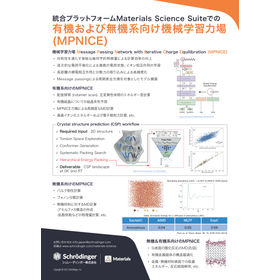Case Studies: Machine Learning for Materials Research
Case studies on inorganic solids and polymers! Designing new compounds in a cost-effective and time-efficient manner.
High-quality physics-based simulations and machine learning approaches accelerate the research of new materials and shorten the time to market. Through the workflow, it is possible to automatically create hundreds of predictive models using representative machine learning techniques (Partial Least Squares Regression (PLS), Multiple Linear Regression (MLR), Principal Component Regression (PCR), Kernel PLS) combined with descriptors and fingerprints, and select models with high predictive performance (AutoQSAR). For datasets with thousands of data points, similar to AutoQSAR, the workflow allows for the automatic creation of predictive models using deep learning (DeepAutoQSAR, DeepChem/AutoQSAR). To represent the properties of a wide range of materials (polymers, molecules, solids), effective descriptors customized for each system can be utilized.
basic information
【Case Studies】 ■ In the prediction of the glass transition temperature (Tg) of polymers included in the bicerano dataset, the prediction model using customized polymer descriptors significantly reduced the root mean square error (RMSE) from 38K to 11K compared to using general descriptors. ■ A model was constructed that can accurately predict the 29Si NMR chemical shifts of silicon nitride using periodic three-dimensional descriptors. ■ A model using 140 descriptors based on chemical composition and structure accurately predicted the bulk modulus of 1181 inorganic crystals (over 60 elements) with high precision (R2=0.913). ■ The band gaps of 3000 transparent conductive oxides included in the NOMAD 2018 Kaggle challenge were accurately predicted by a deep learning prediction model built using 10 SOAP-PCA 3D descriptors and AutoQSAR/DeepChem. ■ A deep learning prediction model capable of predicting the water solubility of 8773 molecules collected from literature was constructed using AutoQSAR/DeepChem (R2=0.88). *Please feel free to contact us.
Price range
Delivery Time
Applications/Examples of results
*For more details, please feel free to contact us.* [Other Case Studies] ■ Construction of a deep learning prediction model (classification model) that enables accurate prediction of the taste (sweet/bitter) of small molecules using hyperparameter optimization of AutoQSAR/DeepChem. For the classification of 2428 molecules (bitter/not bitter), R2=0.926. For the classification of 2366 molecules (sweet/not sweet), R2=0.936. ■ Prediction of the properties of silicate glass with added oxides. ■ Construction of a prediction model for the yield strength of iron alloys.
Detailed information
Related Videos
catalog(5)
Download All Catalogs
News about this product(2)
Recommended products
Distributors
Schrödinger Co., Ltd. is the Japanese subsidiary of Schrödinger Inc., headquartered in New York, USA. Schrödinger has a history of about 30 years in developing software that integrates advanced technologies in chemistry and computer science, primarily in the fields of materials science and life sciences, providing advanced solutions for drug discovery, biologics, and materials research and development.













































